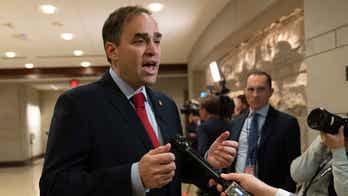Anti-American protests rage across the Middle East
James Rosen reports from the State Department
Washington Democrats and Republicans are questioning U.S. taxpayer aid to the Middle East amid anti-American riots in the region and the fatal attack on the U.S. Consulate in Benghazi, Libya.
And that aid adds up to billions of dollars every year. In Tunisia, the State Department has allocated more than $300 million dollars since early 2011. In Sudan, the U.S. spent more than a half million dollars in 2012. And the tab for Egypt and Libya alone since last year exceeds $3 billion dollars.
One of the first attacks occurred Tuesday at the U.S. Embassy in Cairo, Egypt, a country that has received $1.6 billion in each of the past four years. Egypt has since 1979 been the second-largest recipient of U.S. aid, following Israel. Roughly $1.3 billion of that annual aid goes to Egypt’s military, according to Congressional Research Service.
Four Americans were killed Tuesday in the Benghazi attack, including Ambassador Christopher Stevens.
Like Egypt, Libya was part of the political uprising that started in late 2010 known as Arab Spring in which residents in the Middle East brought down long-standing dictatorships. However, residents have struggled in the aftermath to bring democracy and political stability to the region.
The U.S. has since the start of the uprisings in Libya in early 2011 given that country more than $200 million -- including $89 million in humanitarian assistance and $25 million from the Defense Department, according to Congressional Research Service.
Several Capitol Hill Republicans have since the recent anti-American attacks started calling for either a stop to such aid or at least tighter restrictions, despite the Obama administration saying that cutting off support would not resolve the “complicated” Middle East situation.
“The American people are tired of this,” Sen. Rand Paul said Thursday on the Senate floor. “Our Treasury is bare. There is a multitude of reasons why we should not continue to send good money after bad.”
Paul, R-Ky., said such action should be taken in Egypt, Libya, Yemen and Pakistan. And he has proposed an amendment that would require those countries to help in the investigations of the attacks on U.S. embassies in Yemen and Egypt and the consulate in Benghazi.
Yemen received $64 million this year, compared to $134 million last year, according to Congressional Research Service.
"Not one penny more for Libya or Egypt or Pakistan until they act as our allies," Paul continued. "Some say we have to keep sending it. Fine, let's send it when they act as our allies. Let's send it when they start behaving as civilized nations and come to their senses.”
Paul's remarks follow Secretary of State Hillary Clinton saying the attack was the work of "a small and savage group – not the people or government of Libya."
She also acknowledged that Americans were likely asking: "How could this happen in a country we helped liberate, in a city we helped save from destruction? This question reflects just how complicated and, at times, how confounding the world can be."
Still, some House Republicans had a point of view earlier this week similar to Ryan's, suggesting that they would vote Thursday against the continuing resolution to keep the government running, in an attempt to cut off aid to Egypt and Libya.
“It would show a tremendous amount of leadership from this administration, in light of the recent developments, if the president were to come back and demand that the amount of money that is in the [continuing resolution] for Libya and Egypt be stripped,” said Louisiana GOP Rep. Jeff Landry, according to The Hill Newspaper. “That would be tremendous leadership.”





